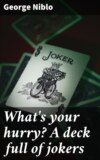Buch lesen: «Step Lively! A Carload of the Funniest Yarns that Ever Crossed the Footlights»
STEP LIVELY
There, there, there! Don't make such a racket or you'll make me nervous.
The manager said to me this morning: "Just give 'em a little nonsense, Mr. Niblo. You know a little nonsense, now and then, is relished by the best of men."
That's the reason he engaged me; said I was the most nonsensical man he ever knew. That's right. Laugh at me. Oh, I dearly love to see people's faces wreathed in smiles.
I've always been a seeker after fun myself.
Why, would you believe it, I once walked twenty miles to thrash a fellow – just for fun.
What's that – twenty more miles back again? Well, to tell you the truth, that didn't bother me.
You see, they carried me back in an ambulance.
I was thinking of telling you a ridiculous story about the dirty window, but I guess I'd better not.
You wouldn't see through it, anyway.
Instead of that let me relate a few amusing things that happened to me while I was on the road last summer.
I always start in a Pullman, and generally come back – well, what's the use telling family secrets?
While I was doing the Ohio theatres I spent some little time with an old friend.
He is engaged in a country school, and for five days in the week wrestles with the task of teaching the young idea how to shoot. I went to see him at work, and of course the scholars were more backward than ordinary. Just as the baby will never be cunning when strangers are around.
It was a lesson in geography that quite broke me up.
"What is a cataract?" asked the pedagogue.
There was a complete frost.
No one had any idea apparently.
"Well, what is meant by a cape?" said my friend.
This was better. One of the children knew it was a point of land jutting out into the water.
"What is a strait?"
Over in the corner a hand went up.
"I know, teacher," said a small boy.
"Well, what is it?"
"It beats three of a kind," was the triumphant answer.
Feeling a little indisposed while at Sandusky, I sauntered into an apothecary shop, intending to purchase some mild drug, to the use of which I am addicted, and which usually comes to us from Havana.
As I stood a moment after getting my light, an old country-man came shuffling in.
He was a character, I'm telling you; why, it stuck out all over his furrowed face just like the tracks of a lost hen in the mud.
I saw him pull out a red bandanna handkerchief and frown as he surveyed the big knot in the end.
You needn't smile – that old codger wasn't the first man to forget why he had tied a knot in his handkerchief or a string around his finger.
"Well, uncle, what is it?" asked the clerk.
"I'll get around to it pretty quick. Now, what place is it down yonder on the lake?"
"Do you mean Put-in-Bay?"
"Yep, that's it. Now, who was it that put in there?"
"Perhaps you mean Commodore Perry?"
"The very man. And I want a bottle o' Perrygoric."
I saw at once that man knew what he was after, and was bound to get it.
Sandusky seems to breed that species.
Why, when I was at the station, waiting with a big crowd for a train that was late, a wide-awake chap pointed out to me a poorly dressed woman who sat alone and apparently disconsolate.
"Look here," called out this fellow, raising his voice and getting a crowd about him, arousing immediate attention, "this poor woman has no ticket to her destination. I'll chip in ten cents for her. Who'll help?"
Presently he had a hat partly filled with coin, which he dumped in her lap.
Then he called out again: "She has more than her fare, but not enough for a shawl. She needs a shawl; I'll chip in a quarter for that."
Again he made the round and again announced:
"She ought to have a bonnet. I'll chip in half a dollar for the bonnet."
When he made the rounds the third time, a newcomer entered the station, shook hands heartily with the woman, and turning to the philanthropist, said:
"Why, Hiram, I'm glad to see you and your wife again."
"How's this?" asked one of the contributors while the rest of us gaped. "Is this woman your wife?"
"Yes," drawled the philanthropist, grinning.
"What right have you to collect money for your wife?" demanded several.
"What right have I to collect money for any other fellow's wife?" was the retort that closed the debate.
I've never ceased to believe that fellow was the nerviest bunco man I ever met.
I traveled down to Coney Island the other day with a friend recently married.
They went to housekeeping, and I suspect the little woman has been bombarding him with all manner of fearful dishes which she insists upon trying.
That's so like my Clara – oh, so like! Did I ever tell you about Clara? Well, I'll sing about her instead. Listen:
My Clara bought a gaudy book,
With colored pictures illustrated:
It teaches her, she says, to cook —
In other things she's educated.
But, oh! she still her bread will burn,
Her steak is hard and she will fry it;
To cook I know she'll never learn,
Why will she try it?
I have a friend who wrote a book —
He means, he says, to write another,
The greatest fortitude it took
To hear it read. I had to smother
Some awful yawns. I'd have to call
The man a silly fool who'd buy it;
But then poor Jones can't write at all,
Why will he try it?
I know a girl who loves to sing
And does so at the least persuasion
Or none at all – an awful thing,
I know by one most sad occasion.
Her voice might have some sort of use
If to saw filing she'd apply it,
But singing! She has no excuse.
Why will she try it?
And so it goes. Most people pant
To do the things they're most unfit for —
To preach – to paint – we know they can't —
And what they can don't care a bit for.
Perhaps we, too, our callings miss,
But tell us so and we'll deny it.
We still will fool with that or this,
Why will we try it?
Good deal of truth there, you'll admit.
But speaking of Coney Island, many's the happy hour I've spent on its historic sands. And perhaps I've done my share at amusing the thousands who throng there on a hot holiday.
Yes, I was the Mikado of the seaside.
That was in the days when I never dreamed I should be standing before so brilliant an audience as I see before me tonight, in such a magnificent theatre, and under the auspices of such a generous-hearted proprietor – that means another fifty per! No, no, it was in the dear, dead days, when the world was young. It makes me weep to think how we fleeced – I mean entertained – those Coney Islanders. We gave a little show on the sands, and we had with us one jolly old actor who only once attempted playing in the legitimate. I was curious about that "once."
When in a confiding mood I confessed that I had heard of his aspirations, he chuckled and admitted that years back, growing disgruntled with amusing people he had boldly essayed the role of Hamlet.
"Well," I remarked, encouragingly, "I suppose the audience called you to come out before the curtain?"
"Called me," he said, soberly, "why, they just dared me!"
Then there was Signor Tossi, the wonderful diver, who for a stipend plunged from an elevated platform into a tank of water.
"See here," I said to him boldly one day, "the danger about this drop isn't much – how have you got the nerve to call it a leap for life?"
"Why, don't I make my living by it? See?"
I guess he was right, don't you?
You can just believe a Coney Island audience doesn't fancy being held up or swindled. But they put up with a good deal of it just the same.
Nor do they have any patience with delays.
Things must hustle right along down there to be popular.
Once this same actor tried to give a scene from Othello, where the filmy handkerchief plays such a part as evidence of Desdemona's amours.
You remember Iago sets up the game on his friend and talks about
"Trifles light as air
Are, to the jealous mind,
Confirmations strong as proofs of Holy Writ."
Othello demands the handkerchief be produced, and repeats this several times in order to make it more effective.
The audience, or some of them at least, failed to appreciate this repetition, and grew decidedly restless.
At last, when for the third time Othello called for the handkerchief, somebody yelled out.
"Wipe yer nose on yer slaive, ye naygur, and let the play prosade."
Of course you all know that of late years a certain class of women have taken to enjoying man's attire.
Personally I don't like it.
There are some who do.
When I mentioned my prejudice to Bob Corwin only the other day he fairly jumped on me.
"Disapprove of it!" he said, "Great Scott, no! I wouldn't have it different for the world. Why, it was as good as a circus this morning to watch and listen to my wife when her collar button rolled under the dresser."
It was this same good little wife of Bob's who made something of a mistake a while back.
They had a pretty maid at their house, and perhaps Bob, quite naturally, let his eyes follow her a few times in an absent-minded way.
Men frequently do that, you know – don't mean anything wrong at all, and just simply – well, look.
Of course his better half noticed it.
Now, she was no more jealous than the majority of her sex, but somehow she foolishly began to suspect that he was in the habit of kissing the girl in the kitchen and was determined to catch him in the act.
One Saturday night she saw him pass quietly into the kitchen.
The hired girl was out, and the kitchen dark.
The jealous wife took a few matches in her hand, and, hastily placing a shawl over her head, as the hired girl often did, entered the back door.
Immediately she was seized and kissed and embraced in an ardent manner.
With heart almost bursting, the wife prepared to administer a terrible rebuke to the faithless spouse.
Tearing herself away from his fond embrace, she struck a match and stood face to face with Patrick, the hired man.
My colored barber takes an affectionate interest in my personal appearance.
No doubt he knows how much depends on my presenting a handsome front while on the stage.
"Youh hair 'pears to be fallin' out, boss," he remarked, yesterday, while trimming my locks, "I reckons I kin save it.'"
"All right," I said, promptly, "save it if you want to. I've got no use for it."
Perhaps he makes sofa cushions for the trade.
"I hear your name was proposed as a member of the Bon Ton Colored Artists' Club. Did you get in?" I asked him later on.
"Not dat time, boss. You see, dey white-balled me," he said.
Adolphus has a streak of humor in him.
He is particularly sensitive to the comic-paper jokes connected with a darky's love for chickens and watermelons.
As the years roll on those chestnuts never seem to die.
The barber grew so touchy that he hated the sight of fowls, and even refused to eat eggs.
One day his next door neighbor in Jersey City looked over the wall dividing their places.
"Seem to be busy, Adolphus – what you doing?"
"Jest plantin' some of my seeds, dat's all," remarked Adolphus.
"H'm, thought it looked like you was planting one of my hens."
"Dat's all right, Mr. Johnsing – de seed am inside," said Adolphus.
Adolphus was telling me recently about the poor success a book agent had with his wife.
He was selling a "Mother's Guide."
"With the aid of this indispensable book," he declared, "you will be able to bring up your children properly."
Mrs. Adolphus took the book and weighed it thoughtfully in her hand.
Then she caught it by the edge and brought it down on the palm of her hand, as if to see if it could be handled with ease and dexterity.
"I reckon I don't want it," she announced, "becase, as a fact, I don't see dat it's any bettah dan a slippah."
That's going back to first principles.
And you know as well as I do, that some of our best men were brought up that way.
There is nothing I enjoy better than the rattle of a political campaign.
Take such a hurly-burly time as we had when Jerome was running in New York for district attorney on the reform ticket.
Sometimes they call on me to make a speech, and if given enough time ahead in which to prepare, I get along all right.
Once, however, I was caught napping.
I had been given to understand that my name would be called last, and settled down to pick up some points from the other fellow's remarks, on which I could build. 'Tis an old trick.
Through some mistake my name was called second, and before I could fully collect my wits, I found myself there on the platform bowing to the applause.
"There seems to be some misunderstanding about my being called so early in the proceedings," I remarked, "and the incident puts me in mind of something that once happened in my native town.
"At the death of an eccentric citizen it was learned that he had himself written his epitaph.
"When the lettering on the stone was completed, we all went to see what our fellow-citizen had to say of himself, and this was what we read under his name and date of death:
"'I expected this, but not so soon.'"
That excused me. They didn't want any more speeches from me. They thought it was an insinuation that our candidate would soon be a dead one.
And while I'm on the subject of politics I want to tell you of a little scene that I always look back on with a grin.
I happened to be in one of those happy Western towns during the heat of a campaign where they serve out cocktails and revolvers to all comers.
The governor was a candidate for re-election, and being a hustler, made many hot speeches from the hustings.
Some of the opposition had gathered in front of the hall, and with the idea of making him nervous, interrupted every little while just when he was waxing eloquent.
One very homely-looking man insisted on asking a question about every five minutes.
He usually prefaced them by such remarks as "Just a minute, please," or "Let me interrupt for a minute."
Finally, in an unhappy moment, he broke in with:
"Pardon me, but – "
Before he could finish, the governor, quickly seizing his long-awaited opportunity, replied:
"Well, I've pardoned worse looking fellows than you in my time, and I suppose it would be unjust to draw the line now."
You bet there were no more interruptions after that.
Some of you know Claude de Forrest, the actor.
He occasionally finds an engagement, but never twice with the same manager.
And yet Claude has his good points, and can do some stunts in his line.
Last winter he was playing at the same house where I had an engagement.
As the hero of the play he had just died a glorious stage death.
Loud and long the audience applauded.
At last he appeared before the curtain.
"Ladies and gentlemen," he said, "as you insist on having a man who died a few minutes ago come to life and appear before you with a bow and a smile, I am here to comply with your wish.














